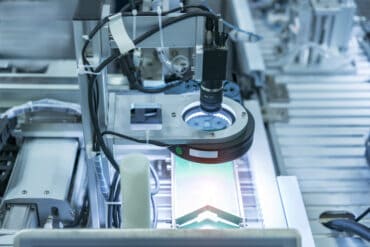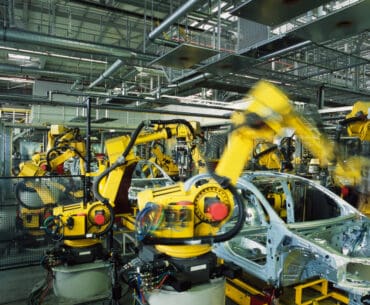
To keep pace with evolving customer demands and market changes, auto manufacturers must adopt smart manufacturing solutions that allow them to rapidly transform their production facilities.
Automotive industry leaders are leveraging smart manufacturing technologies to rapidly transform plants to keep pace with changing customer and market trends, the adoption of increasingly complex technologies in cars, and growing skills shortages among plant workers.
Specifically, they are using smart manufacturing to enable the flexibility to quickly change production lines, plants, and operations so that they can introduce new models and features in the shorter time frames required in today’s marketplace.
Why Rapid Plant Transformation is Needed
The automotive industry is undergoing significant change, driven by the rise of electric vehicles (EVs), advanced driver assistance systems (ADAS), and increasing consumer demand for personalized, connected experiences. Traditional manufacturing facilities often struggle to adapt to these rapid changes, necessitating a shift towards smart manufacturing to maintain competitiveness.
To those points, the transition to EVs and the integration of sophisticated technologies like ADAS present unique manufacturing challenges. Traditional production lines, designed primarily for internal combustion engine vehicles and autos with fewer software-defined features, must now accommodate new components, heavier vehicle structures, and complex software systems.
This shift increases the number of design variants, complicating production and potentially impacting quality and cost. Additionally, the gradual phase-out of combustion engines, expected to continue dominating roads for the next 20 to 30 years, requires flexible assembly concepts capable of handling diverse drive systems simultaneously.
Strategies for Rapid Factory Transformation
To address these challenges, the industry is embracing rapid factory transformation encompassing several key strategies, including:
Extended Collaboration: Integrating product and process development allows manufacturing teams to access engineering data early, enabling concurrent planning, optimization, and validation of operations during product design. This collaborative approach facilitates the reuse of best practices and efficient resource management, driving continuous improvement.
Advanced Automation: Updating legacy equipment with intelligent automation solutions, such as digital twins, software-defined control, artificial intelligence (AI), and auto code generation, enhances flexibility and predictability. This approach enables manufacturers to modernize existing facilities cost-effectively, avoiding the substantial expenses associated with building new plants.
Cost-Efficiency and Sustainability: Standardizing processes and leveraging modular, flexible components tailored to specific needs improve shop floor management and reduce inefficiencies. Implementing AI facilitates edge devices and industrial Internet of Things (IIoT) platforms to facilitate real-time monitoring and predictive analytics, fostering a continuous loop of process improvement and energy efficiency.
Digitally Enabled Workforce: Addressing workforce challenges through immersive training technologies, such as virtual maintenance training and remote assistance, upskills employees and enhances safety. These digital methods ensure standardized, effective training, enabling swift problem resolution and minimizing unplanned downtime.
Leveraging Smart Manufacturing Technologies for Rapid Transformation
By adopting smart manufacturing technologies, automotive manufacturers can enhance operational efficiency, meet evolving consumer expectations, and address workforce challenges, securing a competitive edge in a rapidly changing industry.
Some key elements needed to enhance operational efficiency and enable rapid innovation include:
- Virtual Commissioning: Virtual commissioning in manufacturing refers to the use of digital simulation models to replicate and test manufacturing processes, machines, work cells, production lines, or entire factories before implementing them in the real world. The technique allows manufacturers to validate and optimize the design and functioning of a manufacturing system without the need for physical prototypes or actual production facilities.
- Digital Twins: These virtual replicas of physical assets allow manufacturers to simulate and optimize production processes, leading to improved product quality and reduced time-to-market.
- Artificial Intelligence and Machine Learning: AI-driven analytics provide predictive maintenance insights and process optimizations, minimizing downtime and enhancing productivity.
- Automation and Robotics: Advanced robotics automate repetitive tasks, increasing precision and efficiency while allowing human workers to focus on more complex activities.
By integrating these technologies, manufacturers can create more agile and responsive production systems, better aligning with market demands and mitigating workforce challenges.
Strategic Implementation for Competitive Advantage
To effectively implement smart manufacturing, automotive executives should:
- Invest in Workforce Development: Providing training programs to upskill employees ensures they can effectively operate and maintain advanced manufacturing systems.
- Foster Collaborative Innovation: Partnering with technology providers and research institutions can accelerate the adoption of new technologies and drive continuous improvement.
- Embrace Data-Driven Decision Making: Leveraging data analytics enables real-time monitoring and optimization of manufacturing processes, leading to more informed strategic decisions.
A Final Word on Rapid Factory Transformation
The automotive industry’s evolution demands that manufacturers adopt smart manufacturing solutions to remain competitive. By embracing extended collaboration, advanced automation, cost-efficiency, comprehensive digital twins, and a digitally enabled workforce, companies can transform their production facilities rapidly and effectively.







